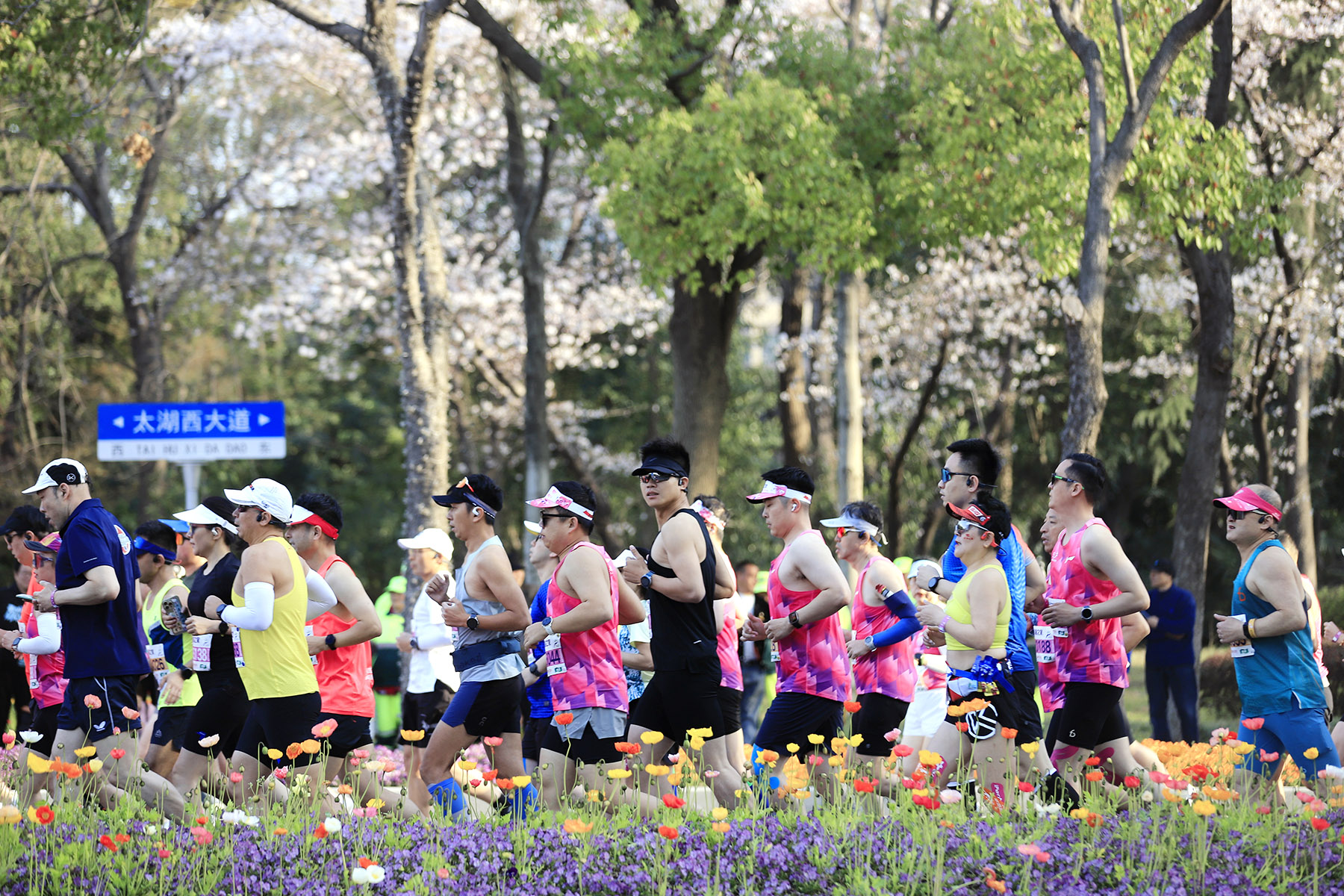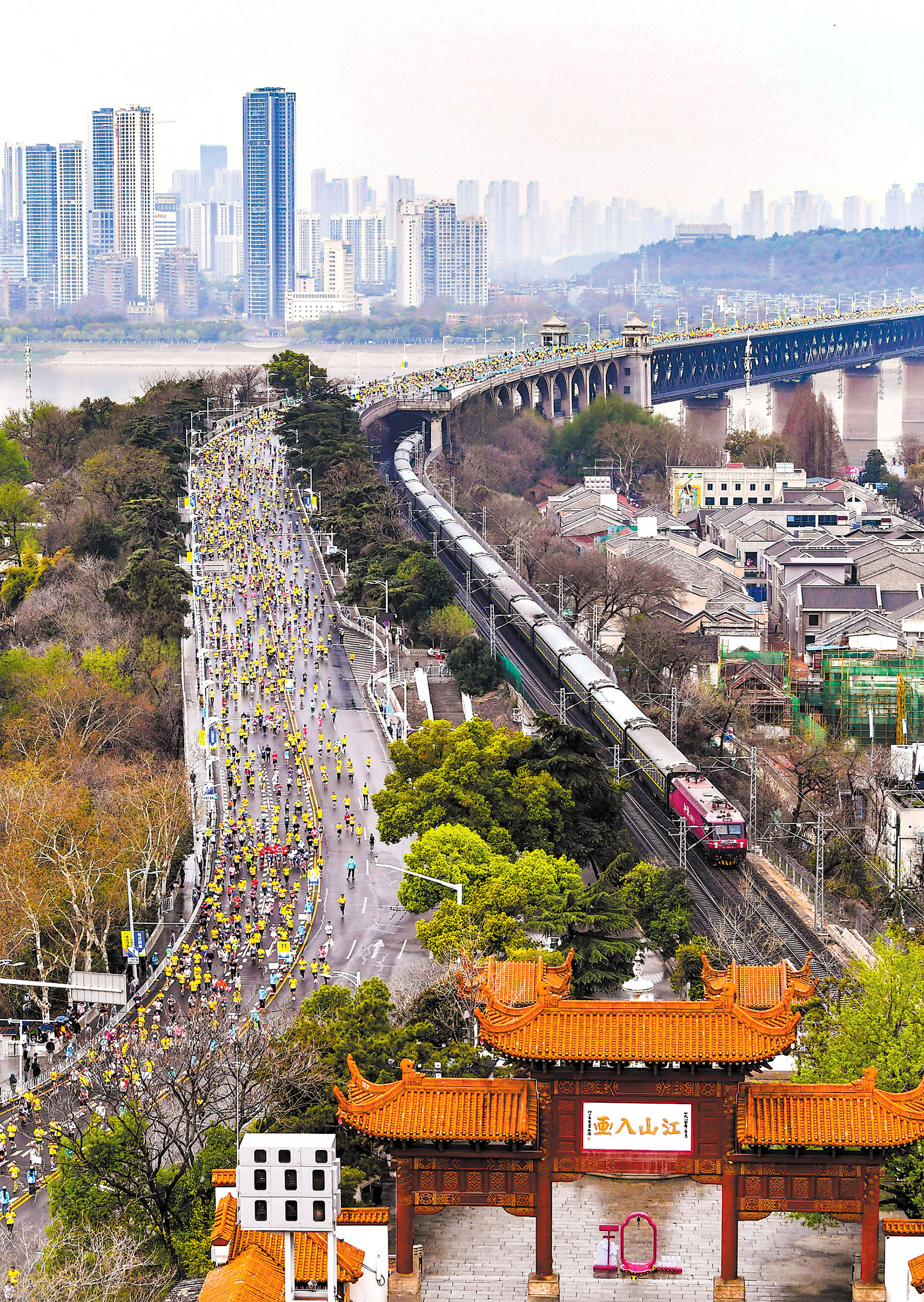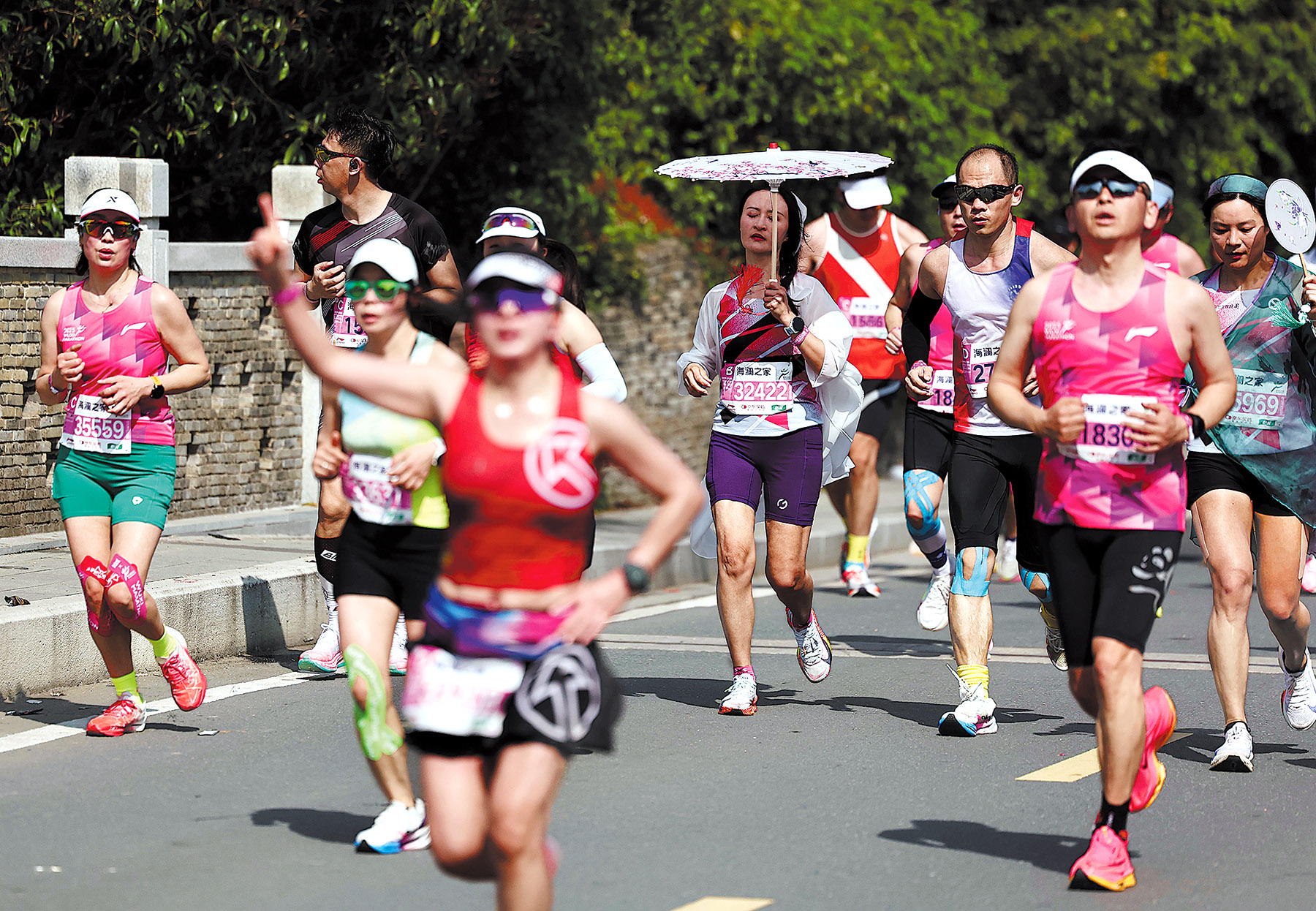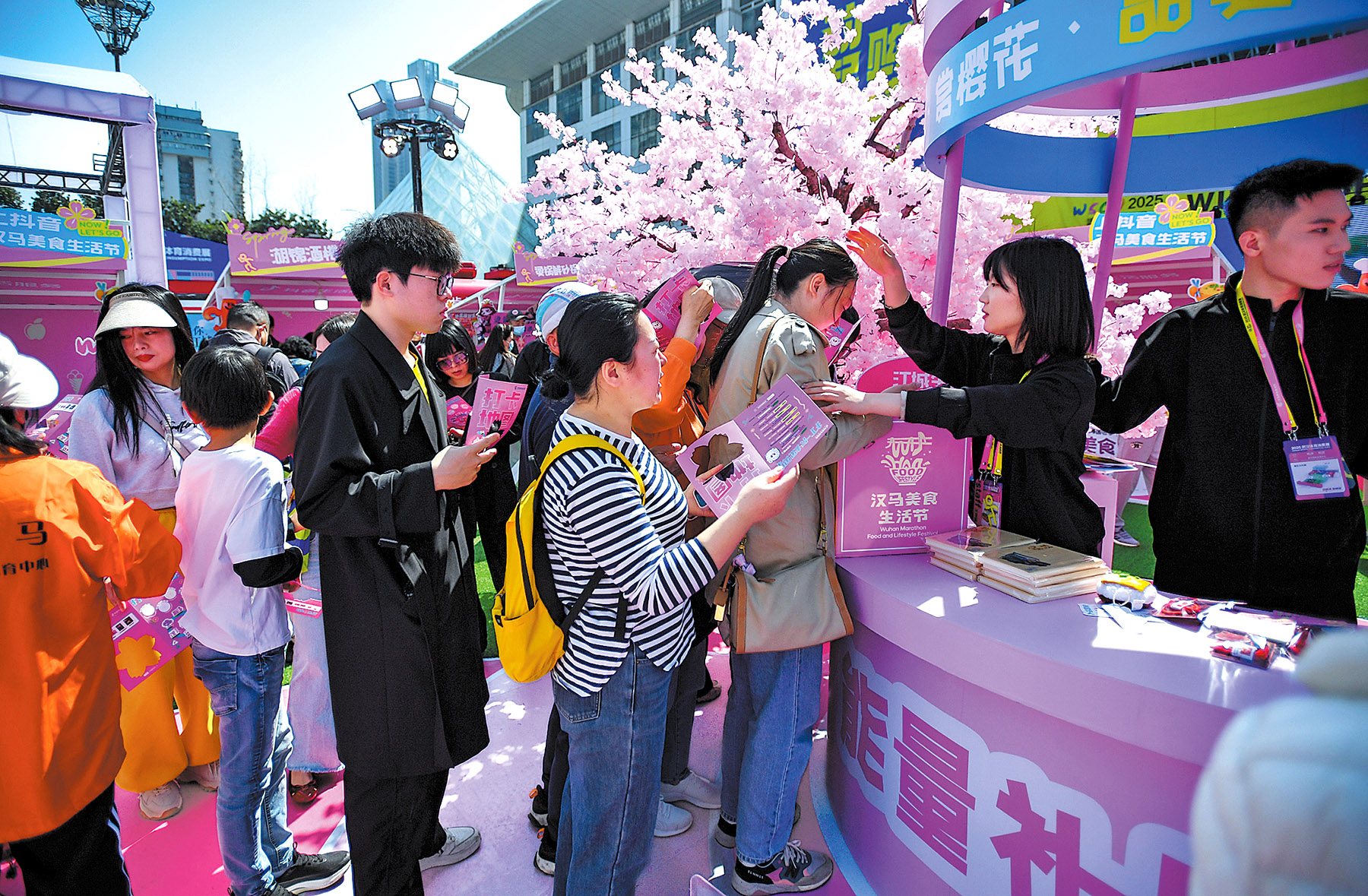Road races promote healthy lifestyles, create economic benefits

WUHAN — With over 20 marathon events taking place across the country, March 23 was dubbed "Super Marathon Day" in China.
Leading the pack was Wuhan Marathon in Hubei province, which expanded its participant limit to 40,000 this year. Demand was high, with over 450,000 people applying for a spot in the race.
For seasoned runner Yang Jun, from Beijing, a spot in the Wuhan Marathon was a long-awaited opportunity. "I had applied five times before and finally got in through the supplementary draw this year," he said.
"It's not only a fitness journey, but also a way to explore new cities," said Yang, who has run tens of marathons in the past decade.
READ MORE: Marathon revival in China hitting its stride
His enthusiasm is part of a broader trend. According to the Chinese Athletics Association, the number of road races nationwide grew to 749 last year, up from 699 in 2023, attracting more than 7 million runners, an increase of 1 million compared to last year.
The growing fever for road running has also reshaped many aspects of broader society.

Healthier lives
In a light drizzle and 18 C temperature, Ethiopian runners Asefa Mengstu Negewo and Guteni Shone Imana set new records in the men's and women's events in Wuhan in March. Meanwhile, Chinese marathon star He Jie broke the national record for the Wuhan Marathon, finishing in 2 hours, 10 minutes and 29 seconds.
"I wasn't in my best condition after my recent Tokyo Marathon, but the rainy and cooling weather allowed me to enjoy the race," he said. With the Wuhan Marathon now an official World Athletics Gold Label event, He embraced the chance to compete alongside top international runners.
Chinese runners' performances have seen improvements on the international stage. According to the China Road Running Work Report published by the Chinese Athletics Association, over 18,000 runners completed marathons within three hours at certified races last year, and the national average marathon finish time improved by more than 5 minutes to 4 hours, 7 minutes and 1 second.
While elite runners chase records, many amateur participants prioritize health and the experience over personal bests.
Chen Weifen from Shandong province finished the race in 2 hours, 35 minutes and 50 seconds as the fifth fastest Chinese woman. "This was not my best performance, but I felt no regret. My main goal is to enjoy the race atmosphere in different cities."
Similarly, Yang has seen transformative benefits from running. "I used to weigh more than 90 kilograms due to a sedentary lifestyle. Running marathons helped me shed 20 kg, and now, I wake up at five am every day for an hour-long run before work," he said.
Beyond weight loss, running has given him improved focus and energy. "I don't run for bragging anymore. I run for the joy of it."

Accelerating industry
As fitness culture gains popularity, more Chinese runners are willing to invest in sports-related industries.
"The toughest part isn't running the race — it's getting selected," said Dai Dongsheng, a runner from Chengdu, Sichuan province. "Once you're in, spending on entry fees, gear and travel is just part of the experience."
Marathons have driven significant economic activity, particularly in sportswear, wearable tech, as well as nutrition and recovery products.
"To prepare for the Wuhan Marathon, I spent 299 yuan ($41) on a running shirt, 399 yuan on shorts, 600 yuan on earbuds and around 1,000 yuan on shoes," said Luo Fuyuan from the Guangxi Zhuang autonomous region, whose investment paid off with a personal best of 2 hours, 30 minutes and 58 seconds.
According to the 2023 China Road Race Report, 90 percent of runners purchase sports protection gear, with 30 percent spending over 2,000 yuan annually. Meanwhile, 59 percent of runners invest over 1,000 yuan in wearable tech, and over 10 percent spend more than 5,000 yuan.
The tourism industry also benefits from marathon-driven spending. The Wuhan Marathon organizers reported that some 71,000 tourists visited Wuhan due to the race. Visiting runners generated 1.17 billion yuan in direct spending, and the total economic impact reached 2.98 billion yuan, up 40.2 percent from the previous year.
"The marathon boom and consumption fever for sports gear are the natural result of the rising incomes of Chinese people and their increasing focus on fitness," said Jing Yan, a professor at Wuhan Sports University.

Embracing branding
A broad consensus has been reached in China that a marathon is a good way to promote cities. The Wuhan Marathon coincides with cherry blossom season, and organizers enhanced the course with flower displays and scenic spots.
"The cherry blossom-lined roads were stunning," said Li Zhengyue from Fujian province. "The scenery, together with the cheers from spectators, kept me going, and the experience left me with a great impression of the city."
For many runners, marathons also mean travel opportunities. "I've always wanted to see Wuhan's cherry blossoms. Since the event offers discounts on accommodation and sightseeing, I brought my family along. We'll stay two more days after the race to enjoy the city," said Chen.
ALSO READ: Marathon events gather pace after three-year hiatus
Chinese cities have embraced this concept by designing marathon routes with their landmarks. For example, the Beijing Marathon starts at Tian'anmen Square and passes the National Centre for the Performing Arts and Olympic venues. Meanwhile, Chongqing's race includes the Yangtze River Cableway and the Hongya Cave.
According to a report released by the General Administration of Sport of China, a single large-scale marathon, such as the 2023 Shanghai Marathon, can generate economic benefits of 6 to 7 billion yuan. Even mid-sized marathons contribute significantly — like the 2023 Zhengzhou Marathon, which boosted the local cultural, sports and tourism industries by 1.46 billion yuan.
"Cities should tailor marathon events to their own strengths rather than creating similar experiences; it would be better if smaller cities can develop a sustainable and unique race culture," Chen said.


